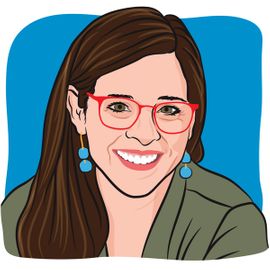- About Us
- Advertise / Support
- Editorial Board
- Contact Us
- CancerNetwork.com
- TargetedOnc.com
- OncLive.com
- OncNursingNews.com
- Terms & Conditions
- Privacy
- Do Not Sell My Information
- Washington My Health My Data
© 2025 MJH Life Sciences™ and CURE - Oncology & Cancer News for Patients & Caregivers. All rights reserved.
The Infertility Ache of Cancer

Danielle Ripley-Burgess is a 20+ year colon cancer survivor first diagnosed at age 17, an award-winning communications professional and the author of Blush: How I barely survived 17. She writes and speaks to encourage others that faith can survive. Also, she bakes a really good chocolate chip cookie. Follow her blog at DanielleRipleyBurgess.com or connect on social media at @DanielleisB.
A colon cancer survivor recalls how she made peace with being infertile as a result of cancer treatments.
Most of the time, if we were going to sit down to chat about my experience with cancer, you’d find me upbeat and optimistic. I’m a fairly positive person, and that comes out when I tell my story. But it’s important for me to not sugar-coat the challenging parts. It’s true: facing cancer brings both ups and downs. Some of the most joy-filled moments are usually contrasted with intense, heart-stabbing pains. One of my most searing pains doesn’t involve the scars, bathroom emergency stories or treatment side effects that linger today. It involves the reality that because of cancer, I deal with infertility. This ache follows me every day.
The words flow off my tongue now, as I’m quick to label myself as infertile and explain why I don’t have biological kids. I can talk about it without crying and even wrote this article with relative ease. But make no mistake: It took me more than 10 years to get here. Nothing feels natural when you’re dealing with infertility.
Becoming Infertile
At first, I wasn’t concerned about my situation regarding childbearing. Diagnosed with colon cancer at 17 years old, I knew the treatments could affect my chances of having biological kids, but I didn’t really care. I had always planned to adopt, even before I got cancer. Plus, I had other things on my mind. I was just hoping to enroll in my senior year of high school.
I didn’t put a lot of thought into what it meant for the doctors to perform an ovarian suspension prior to radiation therapy. Looking back, I can also see how I blocked a lot of fear. Why were common fertility preservation strategies like freezing eggs not an option for me? There was no time. Doctors couldn’t prioritize my ability to create future life and delay treatment with my own life on the line. It was scary stuff, things I didn’t want to think about.
READ MORE: Preserving Fertility in Adolescent and Young Adult Women with Cancer
For years, being infertile didn’t bother me too much. My husband and I considered ourselves fortunate to know I was infertile going into our marriage. We were in no rush for kids, and even when the time came, we didn’t go through years of trying to get pregnant only to face surprising disappointment. Knowing ahead of time saved us a lot of heartbreak. I could count my blessings.
But by the time I hit my mid-20s, when a lot of my friends and family members started getting pregnant, the pain of infertility hit me out of nowhere. The blessings I’d once counted were thrown out the window. Infertility went from something I barely thought about to something that, if I let it, consumed my life. It was like a thief in the night, stealing what I held so dear. Yet the crazy thing was that it stole something that never had a chance at life. This made it even harder. As the reality of my barrenness sunk in, it led me to a dark place. To feel so powerless over whether or not you can create a life, while being physiologically built to create and carry life, is devastating.
Adoption Does not Take Away Infertility Pain
I wondered, like I imagine most infertile couples considering adoption do, if the pain of infertility would go away once the role of “mother” became a reality. Adoption agencies cautioned us to give ourselves enough time to grieve a biological child. I understood their wisdom once a baby girl gave me the proud title of mom. While our bundle of joy did indeed bring healing, laughter and light into our world, it didn’t take away my infertility pains and the reality that I couldn’t bear children like her birth mother did. As I processed this and became real and open about my feelings, adoption became the blessing on the other side of the pain. However, adoption alone didn’t take the pain away. Only time and healing can.
Healing Takes Time, But It’s Possible
As I mentioned earlier, it’s taken me over a decade to get to the point where I can openly talk about infertility. I started telling my cancer story within months of my diagnosis but talking about what it’s like to be a barren woman has taken a lot of time. I needed to grieve and find non-judgmental spaces to let my true feelings come out. I needed to give myself permission to feel angry, cheated and hopeless. I needed to skip baby showers, cry and acknowledge that not having biological children, but wanting them, is really, really hard. Even now, some days are easier than others.
All of this work did eventually turn things around for me. Today, I live with optimism and hope. I’m able to count my blessings once again, but only because I count the losses too.
For more news on cancer updates, research and education, don’t forget to subscribe to CURE®’s newsletters here.
Related Content:



